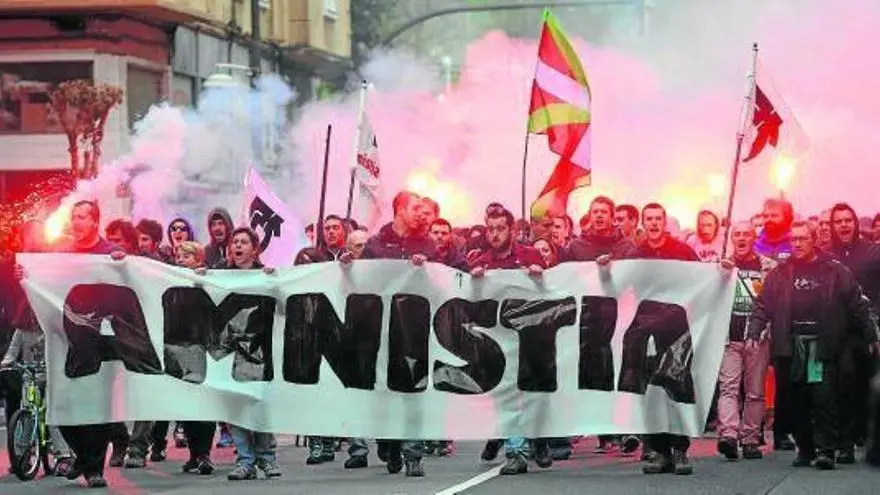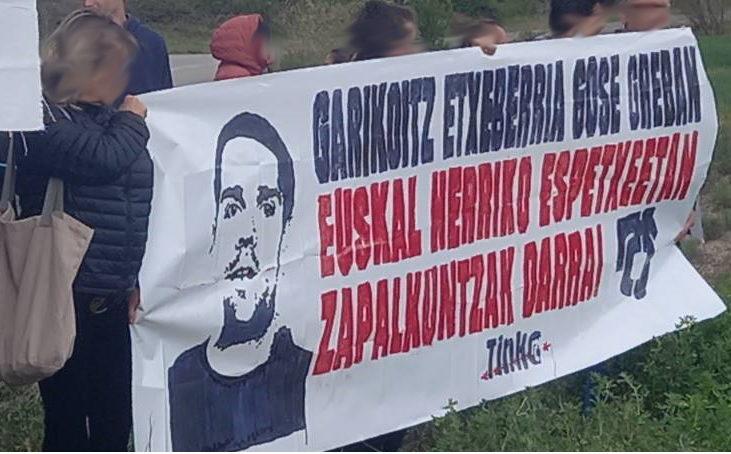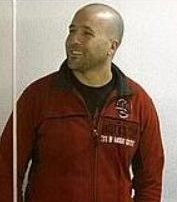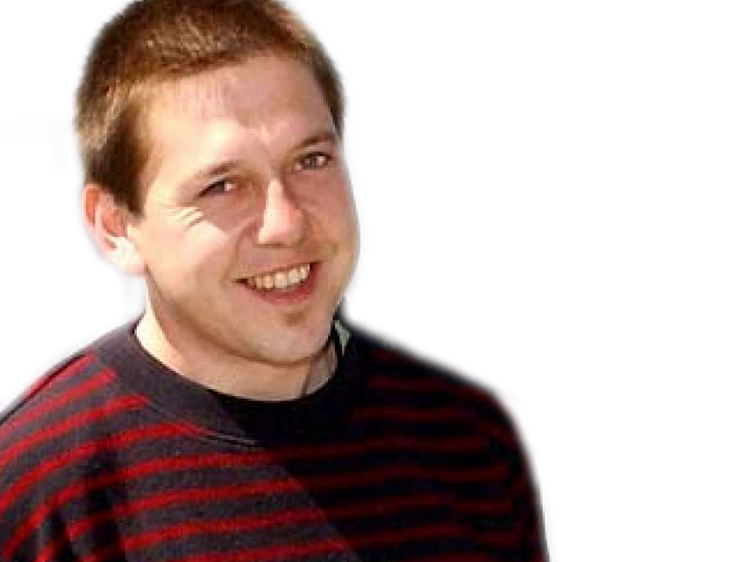
Three Basque political prisoners, Garikoitz Etxeberria Goikoetxea, Jon Kepa Preciado Izarra and Mikel Sansebastian, offered to respond to this interview in order to make known their opinion on the situation in prisons since a large majority of detainees were regrouped in a few prisons in the Basque Country, but they also talk about the current situation in the Basque Country, of the advance of the right on a global scale and also of the Palestinian genocide and the war situation between Russia and Ukraine.
It should be noted that there are still just over a hundred Basque political prisoners in the prisons of both the south and north of the Basque Country. Many of them, like those interviewed here, have already spent several years in prison and in some cases have up to 10 and 15 more years of detention remaining.
● The Spanish regime has concentrated Basque political prisoners in a few prisons in the Basque Country. Has this meant an important change in terms of prison conditions?
On the one hand, all the political prisoners linked to the cycle of armed confrontation against the Spanish State who were dispersed in Spanish prisons are kidnapped in prisons located in the Basque Country, but on the other hand those who are in the French State are still outside our land, the men concentrated in a prison 300 km away and a comrade in a different one 900 km away. At one level, prison conditions have not changed much since the same system of punishment and submission is applied to all prisoners, without forgetting that we are still under the Spanish judicial system and ultimately it is in the National Court where we are decided.
On a day-to-day basis, let’s say that the level of harassment towards Basque political prisoners is lower and more bearable for us. In this new situation we are in conditions in which we are allowed to participate in sports, cultural, entertainment, study activities… that we had not had in previous years. On the other hand, the option of being able to get together with each other is something we enjoy today. As for our family and friends, they have us closer and now they have to invest less time, mileage, economic expenses and corresponding risks to come and see us. On the other hand, the number of visits and their duration is less than in the prisons from which we were transferred, so we are less with our relatives. Precisely the Basque regional government, which manages 3 of the 4 prisons where we are, is denying us the right to communicate with people that the government links to revolutionary sectors of the Basque Country. A situation that did not occur in the prisons of the Spanish State and demonstrates the repressive-ideological level of the Basque regional government. This government, applying an apartheid ratified by the National Court of Madrid in response to the judicial appeals that we have filed, is trying to prevent the relationship between the Basque political prisoners and the popular sectors most committed to the struggle for the national and social liberation of our land, in an attempt to silence them. In the face of this, both inside and outside prison, we have begun to mobilize in the face of this new violation of our rights.
● From your condition as prisoners for fighting, do you consider that this transfer and reunification in prisons in the Basque Country can be considered a small victory, taking into account that for years the slogan “Euskal Presoak Euskal Herrira” was used as “Basque prisoners in the Basque Country”, or does this phrase still have more validity in terms of “Amnesty”?
When we talk about dispersion, we are referring to one of the cruelest prison measures applied under the excuse of anti-terrorist policy. This consisted of the transfer and dispersion of political prisoners to different prisons in the Spanish State, later the French government also applied it. There were comrades imprisoned in the Balearic Islands and in the Canary Islands as well. It began to be applied at the end of the ’80s and has lasted three decades, it was created by a PSOE government with the collaboration of the PNV, and maintained during all these years by the different governments in power. With the dispersion they sought a kind of exile where our people would forget about us, we would lose that union with the people, we would be demoralized and we would abandon our ideals by embracing repentance. But it was our relatives who suffered the most from this policy since they never left us alone. There are countless kilometers traveled to go see us with the physical and economic consequences that this entails. We want to remember that this policy caused the death of 16 of our relatives and friends on the roads when they came to visit us.
“Euskal Presoak Euskal Herrira” was used in this context, based on the right of every prisoner to serve a sentence in the prison closest to their family and environment. Likewise, the demand for Total Amnesty was maintained, which is not only reduced to the freedom of political reprisals, but also demands the return of all political exiles and deportees, as well as the end of all types of repression and the total recovery of political rights and freedoms in the Basque Country, as we are an oppressed people. an essential step for overcoming this conflict through democratic and real solutions. However, the recent reunification has taken place after the EPPK (Collective of Basque Political Prisoners) abandoned all kinds of struggle in prisons, as well as the demand for amnesty, while adopting legal channels from the prison system of both oppressor states, and opting exclusively for individual ways to adhere to the aforementioned social “reintegration” and access “restorative justice” programs. It is also necessary to take into account the parliamentary context of the Spanish Congress, where the Basque political parties EH BILDU and PNV adhere to the PSOE government, without their collusion, they wouldn’t have given neither the transfer of jurisdiction of the prisons of the Basque Autonomous Community, nor our transfers. Therefore, the end of the dispersion has not come due to social pressure, just as the beginning of it has been a decision of the Spanish Government for its own interests and for the political context created, above all, after the disappearance of ETA, nothing to do with a popular victory. Moreover, there has been an effort on the part of the official Basque nationalist left to sell it as a victory, giving the false appearance of having resolved the issue of Basque political prisoners. This has been fueled by the disinformation and programmed demobilisation that the official Basque Nationalist Left has carried out in recent years in this regard, confusing a large part of Basque society.
As for the Amnesty, different sectors in the street and some political prisoners maintain the demand for Total Amnesty since we consider it as a strategic, inalienable and intrinsic position in the process of national and social liberation in the Basque Country, which is being carried out fighting against all kinds of oppression that we suffer as a people and working class.
● How do you analyze the changes that have been taking place in the Basque Country in recent years, taking into account that you inscribed your militant actions imagining achieving Independence and Socialism?
Euskal Herria [Basque Country] is a combative nation, we have spent our entire existence fighting for our rights in the different systems and regimes that have occupied our land and oppressed the majority of this people. Dozens of historical processes and countless generations have preceded us in this struggle and it is now up to us to adapt to the new context.
After the dissolution of a national liberation movement that had been underway since the 1950s, leaving us stranded as political prisoners, institutional social democracy was chosen from the official Abertzale [Basque nationalist] Left. A 180° turn that has led to a depoliticisation and de-ideologisation never before known in Basque society. The normalization and assimilation of oppression, which has not ceased to exist, by a large part of the Basque proletariat is palpable and we live it with great concern from prison. Basque social democracy is surrendered to the bourgeois institutions of the oppressive states of France and Spain. In the latter it plays its role as a crutch of the PSOE government. They try to convince us that by this path we will reach Independence, an unfeasible and false option from the very beginning.
As for Socialism, let us be self-critical and recognize that since the 1980s the class struggle has been abandoned here and therefore that demand has been emptied of content. The reformist social democracy, which called itself the heir of the MLNV (Basque National Liberation Movement), defends the interests of the so-called middle class and part of the Basque bourgeoisie. In this context, the new generations, who are the ones who suffer the worst conditions of the Basque working class, are giving the same or greater importance to the class struggle than to the national liberation struggle.
We have the tools and experience inherited from those who preceded us and one of our most important tasks is to increase and improve that legacy, that of those who fought for our strategic objectives and did not kneel before the oppressor. Each one has to face what one has to do without letting the flame of struggle be extinguished. Those of us who are currently on the front line have had to change the political cycle, we accept it and we know that the only non-negotiable thing is commitment and involvement in the struggle. This did not begin with us and it will not end with us. It will also be our responsibility to transmit our legacy to the new generations who are starting the new cycle. We will contribute our experience from self-criticism and we will be on the side of those who continue with the struggle.

● In recent years, some prisoners and various sectors of Basque society have adopted political-ideological definitions of communism. What does this proposal mean in the context of today’s Basque Country?
As we have said before, we have experienced an important change in the field of struggle, seeing the disappearance of everything that had been part of the life of several generations and of our contribution as a people and working class. This increased the degree of demobilization and demotivation already existing in the Basque proletariat. But the eagerness and need of this people to free themselves from all kinds of oppression has made (especially the new generations who did not live through the last decades) a commitment to organize themselves around a sincere and coherent commitment to the achievement of our objectives. And this has had to be outside the scope of the official Abertzale Left, which today is 100% dedicated to the institutional and reformist camp.
The mobilization and commitment around Communism is one of the bets that has been gaining strength in recent years, having prominence in different terrains where they develop an approach of class struggle to articulate in this way the socialist consciousness of the proletariat in our land. In the same way, another movement has also grown that recovers the concept of the Basque Working People based on internationalist national class consciousness with the strategic objective of Independence and Socialism in the Basque Country. To these structures is added the existence of different organizations that work in the field of anti-repression and defense of political prisoners, in the struggle against projects that destroy the earth and nature… and also the presence of many individual people who come from the previous cycle, where their commitment and contribution in different organizations and types of struggle was essential for the resistance and survival of the struggle of our people. People, like the militants of the movements that have emerged, who do not see in the strategy of the official Basque nationalist Left the forms, the discourses or the praxis necessary to face the challenges that we as a people and working class have in this new era. Let’s say that we have found ourselves at a crossroads, on the one hand social democracy/reformism, also involved in an anti-revolutionary drift, and on the other that of rupture. And it is in the rupture where we position ourselves.
The commitment of the new generations has attracted other sectors to this field, where we will try to promote and expand the class struggle to each of the forms of bourgeois power, to each of the styles of oppression. But the work and the task ahead of us are much deeper, it is about overcoming that degree of depoliticization and de-ideologization that exists among the working class.
The different sectors or movements that are in the option of struggle have coincided in different fields such as in the support of the Palestinian Resistance or in the demand for Total Amnesty, as well as in the mobilizations against multiple projects of Capital that destroy nature, the resources on our land and the lives of the majority of this people.
● What impact has this new reality that has emerged in the Basque Country had on prisons?
The EPPK has followed the path marked by the official Basque nationalist left and the only contributions they have made in more than a decade have been in that direction, feeding that reformist and institutional commitment. Most of the prisoners of this group have supported these ideological positions. On the other hand, as is happening in the streets, some imprisoned militants have not taken up this strategy and several of us have been out of the EPPK for years.
As far as we are concerned, well, for some time now we have been gathering our desire and ideas and contributing what we can in this context. We have published texts in reference to the International Day of the Political Prisoner and on Palestine, among other topics. We have joined the mobilizations organized by the platform “Elkaratasuna Palestinarekin” (Solidarity with Palestine) by fasting. Now, as we have mentioned before, we are immersed in responding to the Basque Government’s attack regarding the denial of visits to dozens of people, actions that are beginning to bear fruit.
Our objective is clear to recover the voice of the Basque political militants who are imprisoned and to be present again in the field of struggle, even more so in the current context, which we have already described above, where every contribution is necessary, valid and essential. We have to recognize that the commitment to the struggle of so many people in the streets of the Basque Country has helped us to make these decisions and to want to be part of all of them.
● What are the causes for not only Europe but also some important countries on other continents to turn to the extreme right and even strengthen fascist positions? What self-criticism should the left make in the face of such a position?
In the Basque Country we are no strangers to this rise of the extreme right, both in the north and in the south of our territory. This is within the development of capitalism, which takes the form of fascism, being an epidemic that infiltrates all aspects of life and shows its true face without complexes or ambiguities. In the face of this, the farce of the discourse of social democracy is not worth it, and even less so the game that is brought in the forums of bourgeois power such as the institutions. Racism, xenophobia, patriarchy… they are in the structures of the State and it does not matter which parties have a majority. The struggle to transform all this is in the hands of the political organizations that walk the streets, that are oppressed and criminalized by Capital and that are made up of people who are deprived of more and more rights and do not care who wins an election since they know very well that no real and integral solution will come from the bourgeois institutions
As for the self-criticism that the left should make, well, on the one hand there is that institutional left, which with a “progressive” discourse tries to give the image of anti-fascist, but always ends up creating and abiding by laws that are at least sterile against the attack of capitalism and leaves the proletariat at the feet of the horses and without hope. It is in this context that the misogynistic, homophobic and racist messages that fill the discourses of the extreme right, the slogan of “national priority”, as well as that much-worked image of hitting the established power, gain strength in different layers of society since they manage to attract all that mass that sees in these messages the solution to their personal problems. to their discontent and to the situations they see in the media, a very important part when it comes to promoting ideas and confusing consciences. That in popular neighborhoods or in areas devastated by the savage socioeconomic policies of capitalism this is an electoral option is worrying, but even more so that the fascist slogans they use are welcomed and adopted normally. This is what must be fought, the depth that this way of facing problems is reaching, seeing life and relationships between people who live in community and share the harsh reality of being oppressed. And this is where we need to be self-critical and recognise that we have failed to raise awareness of the real root of all kinds of oppression and our potential and our responsibility as a class to change things from the ground up. By fighting on every front against the bourgeois power that oppresses us, we will be able to shed light on the real solutions and create class consciousness. Implementing an anti-fascist culture is essential for the society and the world we want to forge. It is there, in the street, where the field of struggle against fascism is located.
The struggle against depoliticization and de-ideologization is key in the current context worldwide, and in the Basque Country we have paid dearly for this aspect and this abandonment of our responsibilities as working class and oppressed people. The challenge is great but essential, we are working on it.

● What does Palestine, the Zionist genocide and the resistance of the Palestinian people mean in the context of what is happening in the world? How do you analyse the behaviour of Basque militancy on this issue?
We are facing a very serious situation that cannot be understood without taking into account the more than 75 years of colonialism that the Zionist State carries out in the land of Palestine. It is one of the cruelest cases where we see the ultimate consequence and purpose of imperialism and fascism, in this matter in the form of Zionism, which is nothing other than destroying the property and lives of the peoples they occupy and attempt to subjugate.
This genocide could not be carried out without the complicity of Western governments or without the direct collaboration of large companies and private forums of the international oligarchy. It is insulting how they try to equate the oppressor and the oppressed, and the way to legitimize the use of violence according to who exercises it. This is another of the usual themes in the manual of imperialism and its media branch. Today we are facing the most fascist government in the history of Israel, where in its eagerness to carry out an ethnic cleansing of the Palestinian people it does not skimp on its own resources and collects the economic, media and military aid provided by global capitalism, something that is framed in the interests of the ruling classes at the international level.
In the Basque Country this issue is very present, and in the analyses and demands the different points of view we have about our own situation come to light. On the one hand there is the institutional sector and those that compose and support it, who see the solution in the creation of two states, legitimizing Israel’s occupation and thus whitewashing Zionism. And on the other hand there is the popular and revolutionary sector, in which we defend the resistance and struggle of the Palestinian people by denouncing the genocide. We demand a Free Palestine from the river to the sea, without Israeli presence or influence.
In this Basque context we want to denounce the complicity with Zionism of Basque companies such as CAF railways, which together with Israeli builders participate in projects of the Zionist government, some of them in illegal settlements. In this way they participate in the confiscation of land from Palestinians, facilitating the Zionist genocide. Against these companies and in general against the murderous policies of the Israeli government, support for the Palestinian people and their legitimate struggle is clear in the Basque Country and a benchmark in the field of resistance and combat against imperialism. We, from prison, have supported calls made by the revolutionized sector and carried out fasts in solidarity with the Palestinian people and against the Zionist genocide. From here we offer unconditional support to the thousands of Palestinian political prisoners, especially the militants of the PFLP, who are suffering from lack of medical assistance, lack of food and torture by their jailers, who are the same ones who have imprisoned, but not defeated, their people.
● Do you think that NATO will continue to pull the rope in provocations against Russia (with Ukraine as an excuse) and that a dangerous amplification of the conflict could be generated?
There is no doubt that NATO’s activity is something that has no rest and its very existence is based on this, on not stopping to cause destabilization on a global scale. With the political-business-military leadership of the United States, its activity is to attack sovereign countries, either directly or through puppet governments or pseudo-popular movements that they finance and push to war and destruction.
The purpose of NATO is the maintenance of a world order subject to Western multinationals and oligarchies, mostly Yankees. What we are seeing in Ukraine and in Palestinian lands are the macabre works of a criminal organization that defends the hegemony of imperialism. In these cases using Zionist fascism and that of the heirs of Stepán Bandera as the spearhead in their attack. It was seen in Yugoslavia, Iraq, Libya, Afghanistan, Syria… there are multiple public and not so public examples that define NATO’s interests well. Therefore, the continuity of this type of conflict or the amplification of those that already exist is something that cannot be ruled out knowing the increasingly urgent need for Capital to feed itself, mainly in the imperialist phase. The end of capitalism is the only way to make these wars of plunder that seek to destroy peoples and submit every km² of this land to their own private interests as a ruling class disappear.

*To conclude, we want to honor the memory of Fernando Morroni and Roberto Facal, two Uruguayan militants who were murdered 30 years ago when they were fighting against imperialist collaboration and for the freedom of our comrades imprisoned on hunger strike and hospitalized in the Filtro under threat of extradition. We also remember that process of solidarity and struggle in which the Uruguayan people kept the pulse against imperialist repression for more than two years. An unforgettable example of internationalism.
We would like to emphasize that this interview has been answered jointly by the three signatories.
Garikoitz Etxeberria Goikoetxea, Jon Kepa Preciado Izarra and Mikel Sansebastian
Basque Political Prisoners
Source: Resumen Latinoamericano